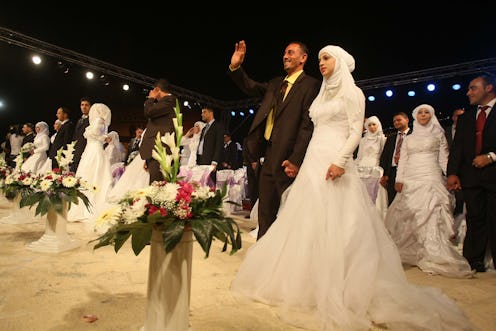News
Muslim Dating Site Will Ease Path To Marriage
If you’re young and Muslim and living in the U.S., you probably have your fair share of awkward matchmaking stories — this at least is the premise of Ishqr, a dating website designed for America’s millennial Muslim population. “If you’re a feminist looking for your bold, humble, feminist brother or a Rumi-and-granola-loving-Muslim, Ishqr is the place for you,” the website proudly proclaims. The sign up button is bright pink and promising. “Say Bismillah and dive right in,” it coos.
Ishqr is the brainchild of northern Virginia native Humaira Mubeen, who came up with the concept in November 2013, initially as a joke. This January, the site had more than 4,000 users. Two months later, according to The Guardian, it has more than 4,500. Mubeen is currently on a publicity tour across the U.S., hoping to expand Ishqr’s reach to 50 cities and raise half a million dollars in development funds. Mubeen told Brown Girl Magazine:
I know a lot of cool guys and I know a lot of cool girls. I don’t really understand why you’re all going back to places like India or Pakistan to marry into pressure because that is what your parents are asking you to do and you have no hope.
Mubeen’s start-up aspired to circumvent such painful necessities, and to serve a community that — at least in terms of dating — differs markedly from the American Tinder-happy mainstream. According to a Mic report, more than 60 percent of Muslims don’t see a problem with being a devout Muslim living in contemporary American society, but a large majority do consider religion as playing a significant role in their lives. To many Muslims, online dating is still unorthodox.
But Mubeen has embedded this sense of difference in the founding principle of Ishqr: “You don’t have to follow the American definition of dating,” she told The Guardian. “Since we are American Muslims, we have our own narratives.” Unmarried at 25, Mubeen’s parents would like her to marry, and she has gone on husband-hunting missions to Pakistan to appease them. They don’t yet know about Ishqr.
And yet, the website’s mission is fundamentally conservative. Sensitive to her target demographic’s needs and desires, Mubeen has ensured that the site is more focused on marriage than on dating. Users can select how serious they are: “testing the waters,” “just friends, ”or “looking to get married, yo.” In addition to the usual trivia about themselves, users can also select three traits that would be a deal-breaker in a significant other. And, in a sweet move to combat superficiality, users are unable to view each other’s photos until after they’ve been matched.
By last December, Ishqr had produced 10 engagements. But the course of true love never did run smooth — not even with the help of a dating app. One engaged couple told Mic of their fight against stigma. Hafsa Sayyeda said:
I definitely felt that some of my best friends thought this was the rather desperate route. They thought, ‘Why not just wait to meet someone in person?’ For me, meeting someone in person would have been ideal, but as that was not happening, why not use whatever resources I had at my disposal?
And the site did, after all, lead her to her fiancé — Asif Ahmed. The lucky guy told Mic, “Meeting someone in person for the purpose of marriage is awkward. … Meeting someone online for the purpose of marriage is remarkably less so.” And quite apart from anything else, that slight-reduction-of-awkwardness — the normalizing of male-female relationships — is a great achievement for Mubeen.
Blogger Nashwa Khan has written of her generation’s unspoken uneasiness about sexuality on her Coming of Faith blog. She writes:
Many Muslim youth face an identity crisis when it comes to sexuality, and largely as a fragmented diaspora that is racialized, we are both viewed as oppressed but also hyper-sexualized. It creates a taboo, almost a shame, about sex – even if it’s sex that is entirely halal between a married couple. Many Muslim women are left torn between a dichotomy of desexualized and hypersexualized narratives tossed at them.
The jokey, friendly, fun tone of Ishqr seems to be one ideal way to reduce anxiety and facilitate conversation; an integration of sincere Muslim values with modern technology and cute visuals. The site’s name derives from Ishq — an Arabic word that Mubeen interprets as “love for God, self and another unique soul.” She hopes it will be a catalyst for millennial Muslims to accept and integrate their disparate identities into a less conflicted and more connected whole.
And it seems the demand is there. Ishqr will shortly be facing competition from new Muslim dating app Minder, portrayed by Pakistani newspaper The Express Tribune as Tinder-with-a-Halal-twist. Another app, Salaam Swipe, will be launched later this year.
Images: Getty Images (1)
